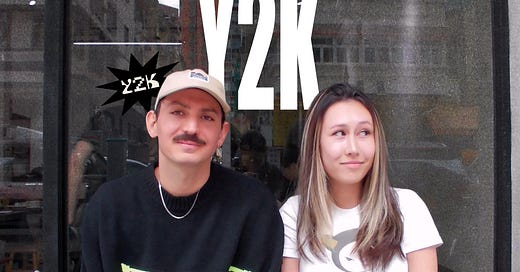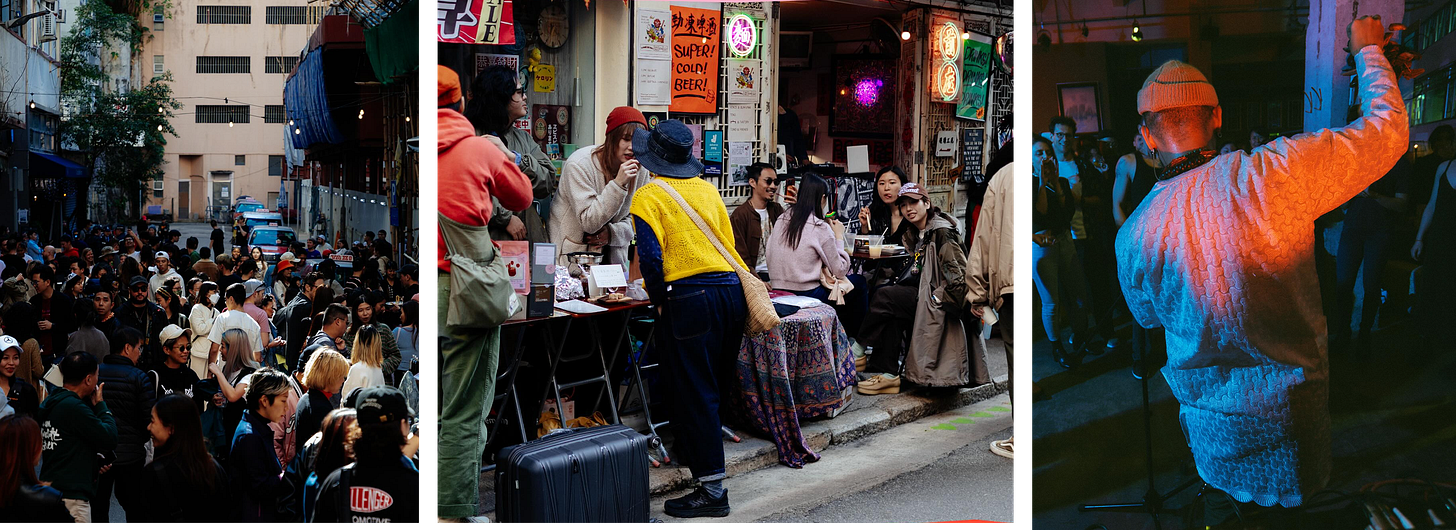Enough Nostalgia — Y2K’s Eyes Are On Hong Kong’s Creative Future
Y2K is reinventing community gatherings for artists in the city, one block party at a time.
It’s the season of “reheating nachos,” as one Vogue Business writer declares. By that, I mean that the world of arts and culture is still very very nostalgic, rehashing and remixing its old work rather than making new ones. Harry Potter is getting a remake. YSL is replicating its archives for Autumn/Winter 2025. And 80s aesthetics are having their moment dominating global advertising. Boom — reheat another pack of nachos.
In Hong Kong, the story is different. Nostalgia is much more tricky and politically fraught when you live in a former colony. Hence why many of the city’s creatives are looking towards the future instead. Y2K, an events agency in Hong Kong led by Nathan Cornish and supported by Tanya Gurka Kwok, is one of them. The irony here is that the organization is literally named “year 2000,” and they gained notoriety in 2021 for hosting “blast-from-the-past” DJ sets at Soho House Hong Kong (guests wore leopard prints, crop tops, and low-rise jeans). But no matter — their recent programming strikes as more earnest. They’ve hosted Wong Kar-wai-themed markets at Heath, Hong Kong’s only mall for underground culture. And in collaboration with Omni Agency, they’ve also organized “Midori,” an annual weekend-long music retreat celebrating nature, the arts, and local talent.
“Nostalgia can’t be permanent,” says Nathan, Y2K’s original founder. Today, the events agency is charting Hong Kong’s new creative future by “redefining” what it means to come together. This April, their signature Block Party is arriving at Star Street. Organized in collaboration with Clockenflap, Y2K is bringing musicians, local restaurants, and creatives to come together as a community.
In the edited conversation below, Nathan and Tanya how they’re planning to build Hong Kong’s creative future. Their vision? One where expat and Chinese creative worlds converge, where we finally wave nostalgia-core goodbye, and where new life is injected into Hong Kong’s unique landscape and urban architecture.
PATRICK KHO: When you first launched in 2021, Y2K’s branding and events were built around nostalgia. It felt almost prophetic, coming years before the 2000s aesthetics started trending in 2023.
NATHAN CORNISH: The first event we did at Social Room in Sheung Wan was themed Y2K, just as the trend was starting. It was a shot in the dark, and after that I was too lazy to change the name. Initially people expected every event to be Y2K-themed, but now it’s just the name of our agency.
I like to think of artists as future builders. And if you’re pivoting away from nostalgia, what world are you trying to create as artists yourselves?
TANYA GURKA KWOK: It’s funny and ironic that Y2K started as nostalgia-core. I say this because everyone will think that the agency hosts “blast-from-the-past” events, but now we want to be forward-looking — not to sound self-important — and redefine what clubbing, entertainment, and events look like. With the block party, our goal is to change what it means to come together, and even make it relevant for even people who aren't trying to club.
What exactly does redefining “what it means to come together” look like?
NC: People are looking for a new backdrop for events. They don’t want to be in a club or be out too late every weekend.
TGK: We’re also leaning into Hong Kong’s natural architecture as a space for community. Everything’s so close together here. The city has the ideal layout for an event like the Block party, almost: You can always find new streets and corners, and different pockets filled with culture. We kept seeing these places and thinking, “What if we just gathered a bunch of creatives in one area?”
What shifts in Hong Kong’s events scene are you noticing? And how is Y2K’s programming evolving in response?
TGK: As for Hong Kong, it’s a perfect time to get involved with events. There’s a boom now — tons of new informal micro-event agencies popping up. It’s really nice to see.
Music is typically reserved for alcohol, drugs, and nightlife. But everyone’s trying to promote healthy ways to enjoy sound instead. In our work, it’s interesting to curate an experience that does just that.
NC: People’s behaviors are changing; the younger generation doesn’t drink as much. While this creates gaps in income for events that usually rely on alcohol sales, opportunities arise to do something different! Like juice bars. The Block Party serves a more niche creative community, which also allows us to experiment in creating new experiences in line with these tastes. For example, we offer live entertainment and less conventional programming like silent discos.
Another ongoing project for both Tanya and I is finding what works for people our age, but then also for families. We’re trying to cater for the larger demographic to make it as welcoming and inclusive as possible.
TGK: We’re also trying to balance local and expat tastes. Because at the end of the day, Hong Kong is a Chinese speaking society, right? Having more niche local artists come on board really helps us exemplify the East-meets-West identity of Hong Kong.
Are you noticing more convergence between expat and local tastes?
NC: It depends on the event. But it’s something that the city definitely needs more of.
TG: Hong Kong needs more connectors… between two cultures, two creative communities.
Art is great for that, a universal practice that transcends language. On that note: compared to other cities, Hong Kong’s arts scene is very much music first. A lot of the alternative and creative culture consists of DJs and music enthusiasts.
NC: Music drives the identity for a lot of promoter nights — you’re totally right. But I think it's also because in Hong Kong, there aren’t enough other non-music art events. The gallery scene, for example, is really small and independent, like Young Soy Gallery, which serves a hyper-niche community. Or, it’s extremely elevated, expensive, and hard to access. The divide between what’s commercial and what’s alternative is a lot smaller for music, and the underground music scene is really strong in Hong Kong.
Where does the Block Party fit in with the need to revitalize space?
NC: We’re trying to re-activate spaces with the Block Party. For Star Street, vendors there have had a tricky time doing business since COVID. And the idea of bringing people back to these hidden gems in Hong Kong shouldn’t be so big — people should already be using these spaces. We’re only trying to make that happen.







